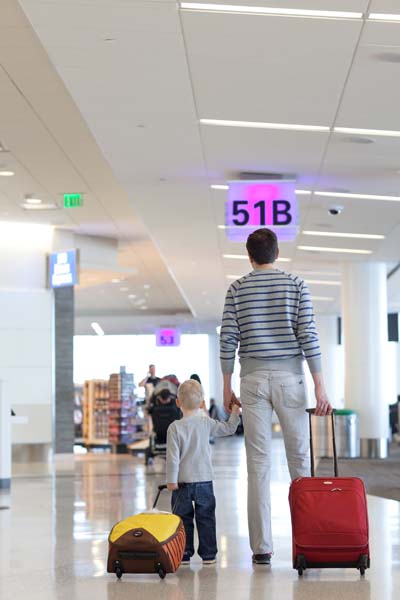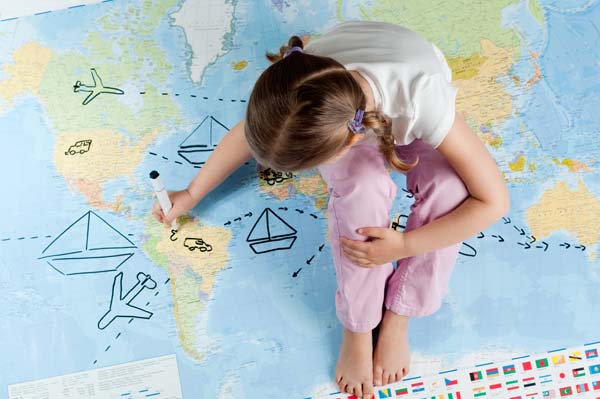I recently asked my father about what was going through his mind when he accepted his first international assignment to Tokyo in 1984. He said, “Honestly, your mom and I just wanted to travel. We wanted to go on adventures. And we knew that you and your sister would adapt to the traveling because we had seen you adapt before.” There was actually not a ton of discussion. They both said the decision to move to Japan was made quickly and easily. My father grew up in a homogenous community in Brooklyn where all of his friends were first-generation American, Catholic and of either Norwegian or Irish decent. He said as a child he would watch the little black and white TV in his apartment and would be enraptured by any footage of the world outside of Brooklyn. He wanted to see the world and he figured that if he would get a lot out of that adventure then surely his children would, too.

My father was right. My sister and I, at ages 7 and 13 respectively, adapted at lightning speed. We loved our little international school in Tokyo and quickly made friends with children from around the world. I tried the strange food my Australian friends called Vegemite. I learned the rules of Oware, the Ghanaian Mancala game. I listened to the terrifying stories of abduction that my friend who grew up in Beirut would share with us. I tried all sorts of dumplings when my friend from Hong Kong invited me to my first Dim Sum. I marveled at the fancy homes of my friends whose parents were ambassadors to Columbia and Portugal. And every day I would walk home from school and stop at the shops along the way, making friends with Japanese store clerks block by block. An adventure it truly was.
Besides being delighted that my sister and I were loving this opportunity as much as they were, my parents were also relieved to find that the international schools provided a more rigorous and quality education than the public schools we would have attended in the US.
After five years in Japan, we moved back the US for a few years and then on to Singapore. Singapore was another adventure that we all embraced. My father told me from a young age to “remember we are gypsies.” By the time I was a teenager I embraced that identity. I believed I was born with wanderlust in my heart and it was with that spirit that I explored the city-state of Singapore.
Still, when it came time to graduate from the American international school I attended, I decided to go back to the US for university while my parents continued their travels overseas. I thought being around Americans and learning more about what it meant to be American would be an adventure in and of itself.
I didn’t expect to have too many challenges adjusting, given that the US was my own country. But about three months into the experience, I started to become depressed. That depression would last seven years. Depression made it hard to concentrate in school, impossible to sleep. I felt alienated from my American peers and had difficulty forming intimate long-term friendships and relationships. All the while, my parents were on another continent, my safety nets and support systems far, far away.
When I first realized that I had a problem, I reached out to my friends around the world who had returned to their “home” countries for university. It turned out that almost every single one was having a hard time. Some were struggling the way that I was, others had turned to drug abuse, a handful dropped out of college and in the worse case, I learned that an old friend committed suicide.

I was shocked that no adult in our international community prepared us for this. My parents were utterly confused by what was going on with me. They were still living overseas and hadn’t experienced reverse culture shock yet. They saw how well my sister and I adapted to a foreign country, how could I possibly be struggling to adapt to my very own?
It must have been scary, or at least frustrating, for them to see me so down and to see that there was somehow a connection between our life overseas and the suffering I was going through back in the US. If their employer prepared them, if support systems were in place at my school, if my university had been trained to see these warning signs, then I could have avoided this stifling depression or at least minimized it. But this was new territory for all of us.
Today, thanks to the help of a psychologist, the support of my friends and family and the camaraderie I have enjoyed in the international community around the world, I am happy and healthy and still so grateful for my time abroad. In fact, I now run a mentoring program for young people growing abroad, ages 16 to 23, called Sea Change Mentoring. I wanted to design a program that would harness the skills and insights that come from the incredible experience of living abroad and apply them to young people’s personal, academic and professional goals. I also wanted to make sure that our mentors helped them develop coping skills and support systems so that they could navigate the challenges of reverse culture shock or the idea of not having a fixed home. It is truly rewarding work.
I asked my mother and father if they observed anything about my sister and I, now adults, that they thought was the result of our time overseas. They both shared the same answer. They said that my sister and I have such diverse friends of all races, nationalities, religions and political views. My mother remarked at how we weren’t intimidated by difference. My father wondered if we had stayed in one place our whole childhoods, would we be as openhearted as we are today? I am grateful for this part of my identity and I see this quality and many other positive qualities like flexibility, creativity and communications skills in the international youth I work with today
The fact is, global youth have such rich experiences and they pick up skills and perspectives that can help everyone around them. My vision for the future is a world where the challenges of being cross-cultural are managed well thanks to strong sources of support so that we can all benefit from these young people’s unique global insight.
Ellen Mahoney is the founder and CEO of Sea Change Mentoring. (www.seachangementoring.com) She is based in San Francisco, California but her work takes her all over the world.



